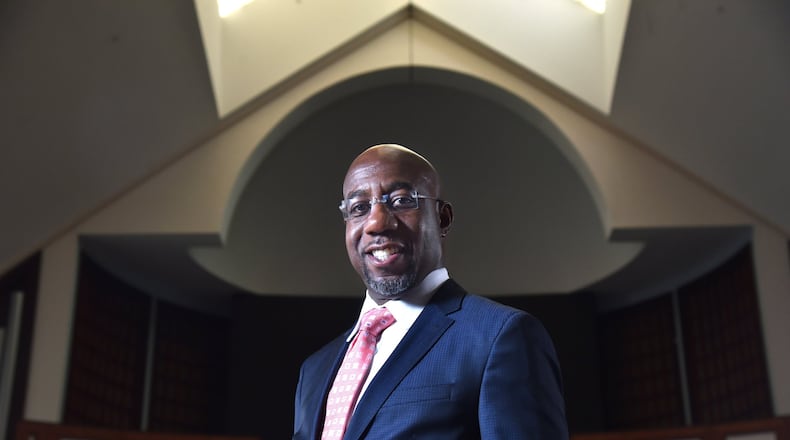The Rev. Raphael Warnock’s national profile further grew, in part, when he joined a group of black pastors who defended a prominent Chicago pastor whose sermons became a flashpoint in Barack Obama’s 2008 bid for president.
The Rev. Jeremiah Wright, the no-holds-barred former senior pastor of Trinity United Church of Christ in Chicago, was known for his fiery, and some would say inflammatory, sermons. He took the U.S. government to task for its past transgressions, including slavery and the Jim Crow era. He delivered passionate remarks about failing schools, income inequality and redlining that he said prevented blacks from achieving the American dream.
Warnock, the 50-year-old pastor of Atlanta’s historic Ebenezer Baptist Church, was among the religious leaders who said Wright had been taken out of context and misinterpreted by the mainstream.
Those critics, Warnock said, failed to grasp the deeper message of Wright’s sermon or the unique role of black pastors who are not just religious leaders but social justice activists.
Now, more than 10 years later, Warnock is the one whose words are being parsed. As the Democrat launches his campaign for the U.S. Senate, political opponents are highlighting his comments in defense of Wright in an attempt to say he is too extreme to represent Georgia. His messages, they say, are radical and out of step with moderate and independent voters whose support he needs to win an election.
As a minister his publicly available sermons are fair game, political watchers say, and more questions about Warnock’s preaching are sure to come as the race unfolds.
“I think some of those statements are going to resurface, especially some of the more extreme ones,” said Eric Tanenblatt, who served in George H.W. Bush’s administration and later became Gov. Sonny Perdue’s chief of staff. Once that happens, it will be people in their homes who will be clamoring for Warnock to explain himself, Tanenblatt said. “Then it’s up to the voters to decide if they’re comfortable with someone taking those positions,” he said.
Warnock, though, stands by his previous comments.
He says he expected his messages to be used against him on the campaign trail, not just his defense of Wright but other sermons in that same vein calling for change and outlining steps to create a “more perfect union.”
“Any fair-thinking person would recognize that everything a government does, even the American government, is not consistent with God’s dream for the world,” Warnock said in a recent interview. “And preaching at its best points out those contradictions but then shows us the path forward.”
‘Not “God Bless America”’
In Wright’s April 2003 sermon, he urged his congregation not to confuse the government with God. He spoke about the failings of the United States to protect its most vulnerable citizens, including African Americans and Native Americans.
Near his closing, Wright uttered the words that drew condemnation:
“The government gives them the drugs, builds bigger prisons, passes a three-strike law, and then wants us to sing ‘God Bless America.’ No, no, no. Not ‘God Bless America,’ God damn America! That’s in the Bible, for killing innocent people. God damn America for treating her citizens as less than human. God damn America as long as she keeps trying to act like she is God and she is supreme!”
In defending Wright, Warnock has compared him to his predecessor at Ebenezer, the Rev. Martin Luther King Jr., whose campaign for civil rights and economic equality was once considered radical.
Warnock likes to remind audiences that King’s final sermon was titled “Why America May Go to Hell,” but he was assassinated before he could preach it. In that sense, Warnock says, Wright’s “Confusing God and Government” sermon is also about holding the country accountable for injustices and oppression.
But the many times Warnock has defended Wright demonstrates that his values are out of step with most Georgians, a spokesman for the Senate Leadership Fund said. The Republican super PAC affiliated with Majority Leader Mitch McConnell has endorsed the incumbent, U.S. Sen. Kelly Loeffler, in Warnock’s race. The organization has also analyzed the pastor’s words and looked for passages it deems problematic.
“Repeatedly defending anti-American diatribes doesn’t make Rev. Warnock thoughtful, it reveals his worldview is dangerously out of the mainstream,” said Jack Pandol, the fund’s communications director.
Warnock is running for the seat currently held by Loeffler, who was appointed after U.S. Sen. Johnny Isakson retired. U.S. Rep. Doug Collins, a Gainesville Republican who was a pastor for 11 years, is also campaigning for the job. In addition, two other prominent Democrats are in the race: businessman Matt Lieberman and former U.S. Attorney Ed Tarver.
All these candidates will face off in a winner-take-all special election in November. If no one receives more than 50% of the vote, the top two finishers will compete in a January runoff.
Warnock hopes to join the ranks of pastors who divide their time between Congress and their religious duties. There are seven ordained ministers currently serving in Congress, according to stats from the Democratic Senatorial Campaign Committee.
The list includes U.S. Rep. Bobby Rush of Illinois, a founding member of the Illinois Black Panther Party, who was elected in 1992 and formed a church in Chicago in 2002 that he pastors to this day.
U.S. Rep. Emanuel Cleaver II of Missouri has balanced his pastoral duties throughout a long political career that includes being elected Kansas City’s mayor. He retired from his church in 2009, five years after joining Congress.
Warnock, the son of two Pentecostal preachers, has served as senior pastor of Ebenezer since 2005, becoming the youngest senior pastor at the historic Atlanta church that was the spiritual home of King and already well steeped in social activism and community outreach.
Credit: Branden Camp
Credit: Branden Camp
Warnock found a church that welcomed his brand of pulpit advocacy.
He is willing to tackle social ills, such as poverty, climate change, mass incarceration, and voter registration and suppression. He has built coalitions with the Jewish community and other faith traditions in doing so. In 2017, he and several other pastors were arrested at the nation’s Capitol when they protested proposed budget cuts.
In a statement, Warnock, who has lectured at Harvard University’s Memorial Church, said that as a pastor, “I believe that the national budget is not just a fiscal document, but a moral document. It reflects what we believe and who we are for one another. And if this mean-spirited budget were an EKG, it would indicate that America has a heart condition.”
Then last year, he held a conference at Ebenezer on ending mass incarceration and invited the Central Park 5 (now commonly referred to as the Exonerated 5) to participate. Now adults, the then-teenagers were wrongly arrested and convicted in the 1989 beating and rape of a white female jogger in New York City’s Central Park.
Warnock called mass incarceration a scar on the soul of America.
Andra Gillespie, a political science professor at Emory University, said the fact that Warnock is a minister and has a paper trail due to his catalog of sermons and speeches gives his opponents material to try to use against him.
So his opponents and their supporters can “just cherry-pick his speeches and soundbites to use against him,” she said.
“It’s no different than when you look at a legislator and try to cherry-pick their voting record,” Gillespie said. “This is going to be the terrain upon which Rev. Warnock’s Republican opponents are going to fight or try to weaken his candidacy.”
‘Should have been expected’
The parsing of Warnock’s words is fair game, said Bruce LeVell, a former chairman of the Gwinnett Party GOP and a top African American surrogate for President Donald Trump. But he cautioned against taking any preacher’s words out of context, saying critiques of Warnock should include the entire message out of fairness.
“You have to expose the entirety from the beginning to the end, and not excerpts and to make them viral,” LeVell said.
Other pastors, including some aligned with Republicans, have faced similar criticism.
Right Wing Watch, a group that “monitors and exposes the activities of Radical Right political organizations,” released tweets earlier this year showing Trump spiritual adviser Paula White praying for “all satanic pregnancies to miscarry right now.” White said her words were taken out of context, and Trump was asked to weigh in.
The fact that links to the comments about Wright are being surfaced by Republicans weeks after Warnock announced his candidacy for the Senate isn’t surprising to some.
“You didn’t think this was coming?” said Anthea Butler, an associate professor of religious studies at the University of Pennsylvania. “If they have to go all the way back to Jeremiah Wright, then that tells me two things: They’re scared of his candidacy because he has a chance of winning, and they’re reaching back into a racist toolkit. They want him out of the race, and they want to mobilize the white voters who are Fox News watchers who remember that stuff. This should have been expected. Is this all they’ve got?”
Warnock has been endorsed by Stacey Abrams, the former Democratic candidate for governor, and the Democratic Senatorial Campaign Committee, lending him front-runner status for the party and attracting new attention to his long career as a religious leader.
Credit: Branden Camp
Credit: Branden Camp
For his part, Warnock said he cannot concern himself with critiques to come and that he will not shy away from the lessons he has preached.
He said he will continue working at Ebenezer full time as he campaigns across the state. But he made clear his campaign will be focused less on the words he has said in the past and more on today's issues, particularly in contrast with Republican opponents.
“I have no doubt that they will cull through my sermons and they will try to find three words in my sermon, but I think when that happens people should ask themselves why are they talking about my preaching or the preaching of somebody who’s not even running in the state of Georgia?” he said. “They can talk about my preaching all they want. I’ll be talking about their goddamn policies.”
» Read more | Who's challenging Kelly Loeffler for Johnny Isakson's U.S. Senate seat
Keep Reading
The Latest
Featured






